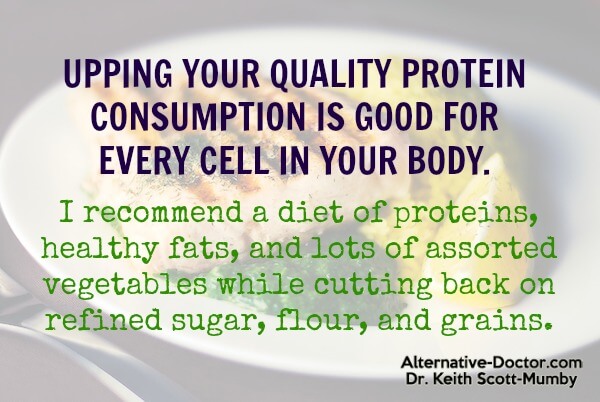Your body needs amino acids (that you receive in food) to manufacture critical proteins. Recent reports link risk factors of memory loss to not getting enough of these necessary building blocks.
What does protein do for you?
- Repairs damaged tissue and produces new cells
- Boosts lasting energy stores
- Controls weight and regulates appetite
- Maintains blood sugar levels
- Stimulates metabolism
- Protects growth and development in young people
- Regulates mood
- Builds blood, muscle mass, bones, and cartilage
- Aides in digestion
- Improves skin, nail, and hair health
- Balances hormones, enzymes, and other chemical reactions
- Preserves brain function and decreases memory loss risk factors
There are different kinds of amino acids (the core material used to make proteins). The most important are essential amino acids. These are only available through your diet because your body is incapable of making them.
The essential amino acids gained through the food you eat are histidine (cell replication), isoleucine (muscle and blood health), leucine (glucose, energy, and tissue repair), lysine (infection fighting), methionine (metabolism and heavy metal removal), phenylalanine (brain chemicals and hormones), threonine (collagen and elastin), tryptophan (serotonin, neurological health, and pain control), and valine (tissue repair and nitrogen balance).
As our diet has degraded over the past decades, getting the necessary range of these critical amino acids has gotten more difficult. Our health reflects these trends.
Memory Loss Risk Factors and Protein
Scientists accepted the role protein plays in neurological function decades ago. They’ve now determined that acetylated tau (defective proteins that become defective) cause the levels of KIBRA (kidney/brain proteins) to drop significantly in the brains of Alzheimer’s patients.
Mayo Clinic’s examination of more than 3,600 donated brains found that tau is actually the primary cause of cognitive decline rather than amyloid plaque (another dysfunctional protein) that has been the core of many scientific studies. The study was published in the medical journal Brain.
As brain tissue is lost, the amyloids and tau accumulate. They cause obstacles to cellular function and eventually result in the death of once-healthy cells. For years, researchers believed amyloid plaque was the bigger threat but now understand there is a duel attack happening at the same time in the brains of those suffering from dementia.
While amyloid begins gathering from outer regions of the cortex (responsible for higher thinking skills such as language and focused thinking) and working its way inward toward the hippocampus (crucial to memories and learning), tau actually begins in the hippocampus and works its way outward to the cortex.
Focusing on the accumulation of tau can predict when cognitive decline begins, the rate it progresses, and where the ultimate scores fall regarding brain function. This is a major discovery in pinpointing risk factors for memory loss.
More research out of Gladstone Institutes published in Neuron found that tau makes it impossible for brain cells to communicate properly and strengthen their connections with other cells, which prevents the formation of new memories.
Author and senior investigator, Li Gan, PhD, explained, “Understanding why and how tau is toxic to neurons is the first step in repairing or preventing the damage it causes in Alzheimer’s disease. Tau disrupts memory by depleting another protein, KIBRA, which is critical for memory formation.”
The tau becomes acetylated (the introduction of an acetyl group to the protein through enzymatic or non-enzymatic reactions) and rearranges the neuron. This process then causes a depletion of the KIBRA protein. When researchers introduced additional KIBRA to laboratory mice, the process was reversed and the memory connection was repaired.
Alzheimer patients have higher levels of tau and lower levels of KIBRA.
Team member and scholar with Gladstone, Tara Tracy, PhD, stated, “KIBRA may be the missing link between tau and memory loss in Alzheimer’s disease. The next step is to determine precisely how acetylated tau causes KIBRA levels to drop, and to explore whether our findings may help develop better treatments for Alzheimer’s disease.”

Protect Your Brain with Adequate Protein!
Naturally, this research will likely lead to a new drug over the next decade. It won’t surprise me (nor should it surprise you) when a synthetic KIBRA pharmaceutical is ultimately released at an outrageous profit.
In the meantime, getting adequate (quality) protein in your diet is crucial to your health. All proteins are not created equal.
- Complete proteins have all the amino acid building blocks your body needs to create strong proteins. For those who don’t follow a vegetarian or vegan diet, these foods are easy to incorporate in your eating plan. Grass-fed cattle (meat and dairy), organic eggs, organic poultry, and many different types of seafood provide the ideal combination of essential amino acids.
- Incomplete proteins usually represent the proteins you get from non-meat foods. In some cases, you may need to combine them to make them complete. A few exceptions are quinoa, buckwheat, spirulina, and Ezekiel bread. Otherwise, mixing beans and rice, hummus and pita, or making a peanut butter sandwich are good ways to get what you need. This is critical for vegans and vegetarians who sometimes struggle to get these necessary building blocks. Adding spirulina, hempseed, or chia seeds are also excellent additions to a morning shake.
Upping your quality protein consumption is good for every cell in your body. I recommend a diet of proteins, healthy fats, and lots of assorted vegetables while cutting back on refined sugar, flour, and grains.
The risk factors for memory loss don’t have to control the future of your brain. You can choose to follow a healthy lifestyle to drop yours significantly. Regular (even mild) exercise, a diverse diet of good foods, controlling body weight, not smoking (or quitting), and giving your brain a regular workout will help you stay sharp into oldest age.
